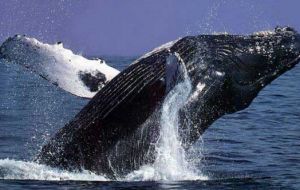MercoPress. South Atlantic News Agency
Whale sanctuary call in advance of 2008 IWC Congress

Representatives from 15 Latin American non-governmental organizations specializing in cetacean research called last week upon Chile's parliament to protect whales against commercial and scientific hunting by creating a Whale Sanctuary in Chilean waters.
The group asked the Senate's Environmental Commission to support a draft agreement seeking a "Presidential Declaration confirming and proclaiming the territorial waters and Exclusive Economic Zone (ZEE) of the Republic of Chile as a Whale Sanctuary" before the 60th Annual International Whaling Commission (IWC) Meeting next year. This whale sanctuary must completely prohibit "commercial and scientific hunting operations in order to assure the conservation of the diverse cetacean species found in the waters of our country," says the agreement. Chile's Senate has approved similar draft agreements in the past. In 2006, senators approved the necessity to grant more priority to the preservation of whales and their ecosystems as a part of Chile's foreign policy, and in 2007 the Senate acknowledged the necessity of a national conservation policy and non-lethal use of cetaceans. The NGOs' presentation to the Senate Environmental Commission was one of the many activities planned for the group of NGOs, which includes representatives from Argentina, Brazil, Chile, Colombia, Costa Rica, Guatemala, Mexico, Panama, Uruguay, and Venezuela. The group is meeting in Chile this week to promote the strengthening of the region's cetacean conservation policies, as well as to coordinate strategies and concrete objectives in preparation for the 60th IWC Meeting, That gathering will be held June 23-27, 2008 in Santiago and marks the only second time the annual meeting has been hosted in South America since its establishment in 1946. Among other topics, the Latin American NGOs will share regional interests, including the establishment of whale sanctuaries, the responsible development of whale-watching tourism, and the strengthening of cetacean research programs. The group of NGOs - coordinated by the Center of Cetacean Conservation (CCC) of Chile, the Whale Conservation Institute (ICB) of Argentina, the Cethus Foundation of Argentina, and supported by the International Fund for Animal and Habitat Protection (IFAW) - will also prepare a presentation before the Environmental and National Properties Commission Chile's Senate. Their presentation will argue for the importance of marine conservation policies as a mode of sustainable development with social, environmental, and economic benefits for more than 500 communities worldwide, generating an annual income of more than US$ 1.2 billion. "Chile belongs to a block of conservationist Latin American countries that is actively working within the IWC to secure a sovereign law ensuring non-lethal use of whales in the southern hemisphere," said CCC president Bárbara Galletti. "The resulting paradox is that under current Chilean law cetacean species are only protected with by administrative fishery measure that prohibits their capture until the year 2025. We believe that the NGO meeting in Santiago is a valuable opportunity to advance towards the establishment of a Chilean Whale Sanctuary that more exactly reflects a foreign policy that will bring the country to international standards in conservation and non-lethal use of cetaceans and citizen interest." Whale hunting, incidentally, has played a significant role in Chile's economic history. In 1943, the company INDUS inaugurated the biggest whale catching business in Chile near the small coastal town of Quintay. The whaling business continued to operate until 1967 when Chile, along with many other countries, signed an International Whaling Committee (IWC) treaty prohibiting all whale hunting. The only countries to not sign the treaty were Norway and Japan. Until 1964, whale products like oil and baleen were consumed mostly by the domestic market in the form of soaps, combs, detergent, meat, and other products. From 1964 to 1967, Japan began using refrigerated boats to carry whale meat products from Quintay to Japan. In its most lucrative year, the whaling business at Quintay killed and processed approximately 1,600 whales. The Kyodo Senpaku company still hunts whales in the Gulf of Corcovado under a license for "scientific whaling" issued by the Fisheries Agency of Japan. Despite allegedly killing these endangered species in the name of science, the majority of the company's catch is sold in the marketplace. The Japanese government will allow 945 whales to be caught this year. The Santiago Times




Top Comments
Disclaimer & comment rulesCommenting for this story is now closed.
If you have a Facebook account, become a fan and comment on our Facebook Page!